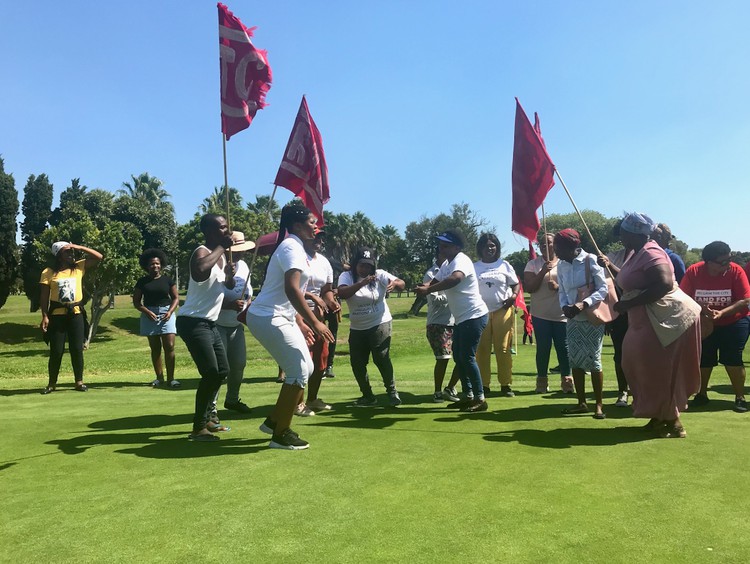Rondebosch Golf Club lease renewal under fire from housing activists
City says floodline makes land unsuitable for development
Housing activists marched on to a green at the Rondebosch Golf Club in February calling on the City of Cape Town to prioritise building affordable housing for working class people. Archive photo: Tariro Washinyira
- The City of Cape Town renewed the Rondebosch Golf Club lease on Thursday.
- The City says half the land is below the acceptable floodline for housing.
- Ndifuna Ukwazi says it can show that two-thirds of the land could be used for housing instead of “exclusive use by a few”.
The City of Cape Town made its final decision to renew the lease with the Rondebosch Golf Club on 29 October, despite objections that the land could be better used for social housing.
The City says the area’s floodline poses a constraint on development with 23.72ha of the 45.99ha property below the 1 in 50 year flood line.
“The golf course was designed to prevent the flooding of neighbouring properties,” the mayoral committee in-principle approval of the lease reads.
Experts from the City’s Spatial Planning and Urban Design Department conducted studies of the Rondebosch Golf Club that identified several constraints. The City said that access for vehicles and public transport will pose an issue; that the golf course is home to trees, shrubs, and 75 different species of birds; and it also manages pollution in the adjacent Black River.
“Polluted water is pumped from the river and gravity-fed back to the golf course holding dam. The process filters the water before it is utilised on the golf course,” the City told GroundUp.
But activist organisation Ndifuna Ukwazi condemned the decision in a statement on Friday, claiming that at least two-thirds of the site can be used to develop affordable housing, according to a research report the organisation published last year.
Ndifuna Ukwazi said that the development could be done in “a sensitive way that would minimise the environmental impact of the development” and that a “water sensitive urban design approach” could be taken for developing affordable housing.
The report, taking into account the environmental constraints, says 2,500 housing units can still be developed on the site.
Ndifuna Ukwazi said that in every case it has advocated for the development of affordable housing on well-located public land, the City argued that there were constraints on the site which made development impractical.
“Cape Town has 24 golf courses, ten of which are on public land. And it’s not just golf courses, the City owns more than 87,000 pieces of land, but continues to lease out well-located public land for the exclusive use by a few at the expense of hundreds of thousands of Capetonians that desperately need housing,” Ndifuna Ukwazi said in its statement.
Support independent journalism
Donate using Payfast

Next: How a rural KZN school keeps hunger away
Previous: Nigerian protesters want Ramaphosa to help end SARS unrest
© 2020 GroundUp. This article is licensed under a Creative Commons Attribution-NoDerivatives 4.0 International License.
You may republish this article, so long as you credit the authors and GroundUp, and do not change the text. Please include a link back to the original article.

